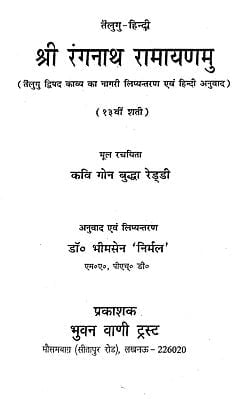Author: Ranganatha or Gona Budda Reddy
About the author: Gona Budda Reddy, also known as Ranganatha, was a poet and ruler living in southern India.
Gona Budda Reddy, also known as Ranganatha or Vennela, was a prominent Telugu poet and warrior who lived during the 13th century. He is best known for his literary work, the “Ranganatha Ramayanam,” which is a Telugu rendition of the ancient Indian epic, the Ramayana. His contributions to Telugu literature and culture have made him a celebrated figure in the history of South Indian literary traditions. Here’s an introduction to Gona Budda Reddy:
Background and Life
Historical Context
- Era: Gona Budda Reddy lived during the Kakatiya dynasty in the 13th century, a time when Telugu literature and culture were flourishing.
- Region: He belonged to the region that is now part of modern-day Andhra Pradesh in South India.
- Role: In addition to being a poet, Gona Budda Reddy was a warrior and a chieftain, serving as a vassal under the Kakatiya rulers. He played a significant role in the military and administrative affairs of his region.
Personal Life
- Family: He hailed from a respected family, with his father and brothers also holding significant positions. His brother Gona Ganna Reddy was a notable warrior and chieftain.
Literary Contributions
Ranganatha Ramayanam
- Title: The “Ranganatha Ramayanam” is also known as “Gona Budda Reddy Ramayanam.”
- Language: Composed in Telugu, it made the epic accessible to the Telugu-speaking population.
- Structure: The work is divided into seven cantos (kandas), mirroring the structure of the original Sanskrit Ramayana attributed to Valmiki.
- Style: Gona Budda Reddy’s version is known for its simplicity and elegance, making it popular among the common people. It incorporates local idioms and cultural elements, enriching the Telugu literary tradition.
Themes and Highlights
- Devotion and Dharma: The “Ranganatha Ramayanam” emphasizes the themes of devotion (bhakti) and dharma (righteousness), portraying Lord Rama as an ideal king and a divine incarnation.
- Moral Lessons: The text imparts moral and ethical lessons, focusing on virtues such as loyalty, bravery, and compassion.
- Cultural Integration: Gona Budda Reddy’s adaptation includes references to local customs and traditions, making the epic relatable to the Telugu-speaking audience.
Influence and Legacy
Literary Impact
- Canonical Status: The “Ranganatha Ramayanam” holds a significant place in Telugu literature and is considered one of the important renditions of the Ramayana in the regional language.
- Inspirational Source: Gona Budda Reddy’s work has inspired subsequent generations of poets and writers in the Telugu literary tradition.
Cultural Significance
- Religious Festivals: The stories from the “Ranganatha Ramayanam” are often performed during religious festivals and cultural events, keeping the traditions alive.
- Educational Value: The text is studied in schools and colleges as part of the curriculum on Telugu literature and culture.
Modern Relevance
- Timeless Appeal: The “Ranganatha Ramayanam” continues to be appreciated for its literary merit and its ability to convey profound spiritual and ethical teachings.
- Preservation Efforts: Efforts to preserve and promote Gona Budda Reddy’s work include translations, digital archiving, and performances, ensuring that his contributions remain accessible to contemporary audiences.
Conclusion
Gona Budda Reddy is a celebrated figure in Telugu literary history, known for his “Ranganatha Ramayanam,” a Telugu adaptation of the Ramayana. His work has enriched the Telugu literary tradition and continues to be revered for its poetic beauty, cultural relevance, and moral teachings. Gona Budda Reddy’s legacy as a poet and a warrior remains an enduring source of inspiration and pride for the Telugu-speaking community.






